I, am trying to handle the http error using the below class in angular 6. I got a 401 unAuthorized status from server. But however I, don't see the console error message.
HttpErrorsHandler.ts file
import { ErrorHandler, Injectable} from '@angular/core';
@Injectable()
export class HttpErrorsHandler implements ErrorHandler {
handleError(error: Error) {
// Do whatever you like with the error (send it to the server?)
// And log it to the console
console.error('It happens: ', error);
}
}
app.module.ts file
providers: [{provide: ErrorHandler, useClass: HttpErrorsHandler}],
HttpCallFile
import { Injectable , Component} from '@angular/core';
import { HttpClient, HttpHeaders } from "@angular/common/http";
import { Observable } from 'rxjs';
import {AuthServiceJwt} from '../Common/sevice.auth.component';
@Injectable()
export class GenericHttpClientService {
private readonly baseUrl : string = "**********";
constructor(private httpClientModule: HttpClient , private authServiceJwt : AuthServiceJwt) {
}
public GenericHttpPost<T>(_postViewModel: T , destinationUrl : string): Observable<T> {
const headers = new HttpHeaders().set('Content-Type', 'application/json; charset=utf-8')
.set('Authorization',`Bearer ${this.authServiceJwt.getToken}`);
return this.httpClientModule.post<T>(this.baseUrl + destinationUrl, _postViewModel, { headers });
}
// This method is to post Data and Get Response Data in two different type
public GenericHttpPostAndResponse<T,TE>(postViewModel: TE, destinationUrl: string): Observable<T> {
const headers = new HttpHeaders().set('Content-Type', 'application/json; charset=utf-8')
.set('Authorization',`Bearer ${this.authServiceJwt.getToken}`);
return this.httpClientModule.post<T>(this.baseUrl + destinationUrl, postViewModel, { headers });
}
// This method is to post Data and Get Response Data in two different type without JWT Token
public GenericHttpPostWithOutToken<T,TE>(postViewModel: TE, destinationUrl: string): Observable<T> {
const headers = new HttpHeaders().set('Content-Type', 'application/json; charset=utf-8');
return this.httpClientModule.post<T>(this.baseUrl + destinationUrl, postViewModel, { headers });
}
public GenericHttpGet<T>(destinationUrl: string): Observable<T> {
const headers = new HttpHeaders().set('Content-Type', 'application/json')
.set('Authorization',`Bearer ${this.authServiceJwt.getToken}`);
return this.httpClientModule.get<T>(this.baseUrl + destinationUrl, { headers });
}
public GenericHttpDelete<T>(destinationUrl: string): Observable<T> {
const headers = new HttpHeaders().set('Content-Type', 'application/json')
.set('Authorization',`Bearer ${this.authServiceJwt.getToken}`);
return this.httpClientModule.delete<T>(this.baseUrl + destinationUrl, { headers });
}
}
admin.user.component.ts file
private getUsersHttpCall(): void {
this.spinnerProgress = true;
this.genericHttpService.GenericHttpGet<GenericResponseObject<UserViewModel[]>>(this.getAdminUserUrl).subscribe(data => {
if (data.isSuccess) {
this.genericResponseObject.data = data.data;
this.dataSource = this.genericResponseObject.data
this.spinnerProgress = false;
}
}, error => {
console.log(error);
this.spinnerProgress = false;
});
}
